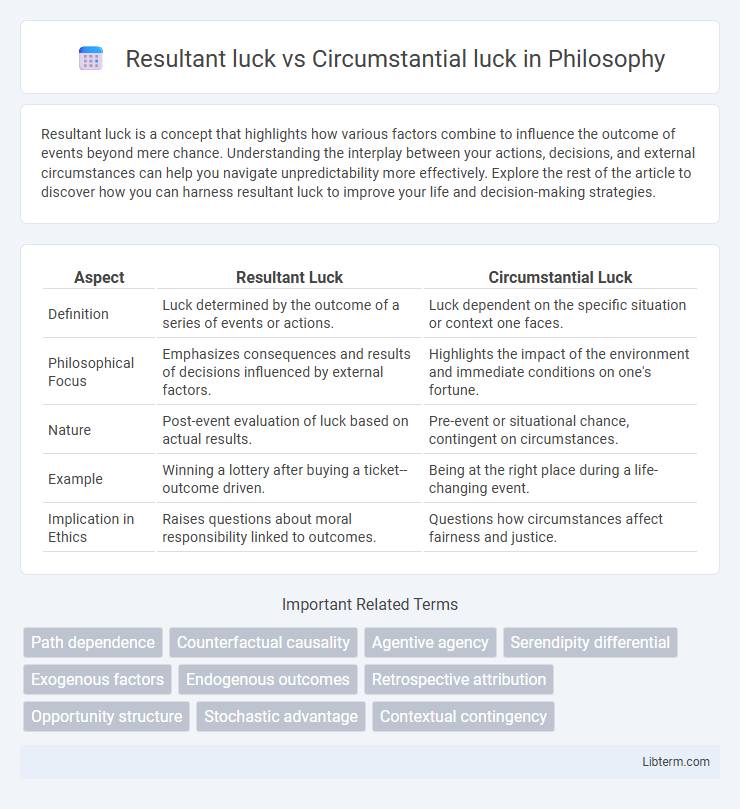Resultant luck is a concept that highlights how various factors combine to influence the outcome of events beyond mere chance. Understanding the interplay between your actions, decisions, and external circumstances can help you navigate unpredictability more effectively. Explore the rest of the article to discover how you can harness resultant luck to improve your life and decision-making strategies.
Table of Comparison
| Aspect | Resultant Luck | Circumstantial Luck |
|---|---|---|
| Definition | Luck determined by the outcome of a series of events or actions. | Luck dependent on the specific situation or context one faces. |
| Philosophical Focus | Emphasizes consequences and results of decisions influenced by external factors. | Highlights the impact of the environment and immediate conditions on one's fortune. |
| Nature | Post-event evaluation of luck based on actual results. | Pre-event or situational chance, contingent on circumstances. |
| Example | Winning a lottery after buying a ticket--outcome driven. | Being at the right place during a life-changing event. |
| Implication in Ethics | Raises questions about moral responsibility linked to outcomes. | Questions how circumstances affect fairness and justice. |
Understanding Resultant Luck: Definition and Key Traits
Resultant luck refers to the outcomes that emerge from a combination of an individual's actions and external factors beyond their control, highlighting the interplay between effort and chance. Its key traits include unpredictability, partial dependence on personal decisions, and the manifestation of results that neither pure skill nor pure luck can fully explain. Understanding resultant luck emphasizes how success often involves navigating uncertainty where effort and external circumstances intersect.
Exploring Circumstantial Luck: What Sets It Apart
Circumstantial luck arises from external situations beyond an individual's control, such as being in the right place at the right time or encountering unforeseen events that create opportunities. Unlike resultant luck, which stems from deliberate actions and decisions aligning with chance, circumstantial luck depends heavily on environmental factors and chance occurrences without direct influence. This type of luck highlights the unpredictable nature of success and emphasizes the role of external forces in shaping outcomes.
The Role of Personal Agency in Resultant Luck
Resultant luck occurs when personal agency directly influences outcomes, as individuals consciously navigate choices that culminate in favorable or unfavorable results. By actively engaging in decision-making processes, people shape their luck through skill, effort, and strategic behavior, distinguishing it from circumstantial luck, which arises from external conditions beyond personal control. Understanding the role of agency in resultant luck highlights the significance of responsibility and intentional action in altering one's life trajectory.
External Factors That Shape Circumstantial Luck
Circumstantial luck is heavily influenced by external factors such as socio-economic conditions, timing, geopolitical events, and environmental changes that individuals cannot control. Elements like market fluctuations, natural disasters, and political stability play crucial roles in shaping opportunities or obstacles encountered unexpectedly. These external variables contrast with resultant luck, which emerges from a combination of personal actions and decisions stacked over time.
Resultant Luck vs. Circumstantial Luck: Main Differences
Resultant luck refers to outcomes influenced by an individual's decisions and actions combined with chance, while circumstantial luck involves external events beyond personal control that create opportunities or obstacles. The main differences lie in the degree of personal agency and decision-making influence; resultant luck depends on choices interacting with chance, whereas circumstantial luck stems purely from situation-driven randomness. Understanding these distinctions helps clarify how much success or failure can be attributed to deliberate effort versus external circumstances.
How Mindset Influences Resultant Luck
Mindset significantly influences resultant luck by shaping individuals' attitudes toward opportunities and challenges, thereby increasing the likelihood of positive outcomes. A growth-oriented mindset encourages proactive behavior and resilience, which enhances the ability to capitalize on favorable circumstances and create advantageous situations. This proactive engagement differentiates resultant luck from circumstantial luck, which depends solely on external factors beyond personal influence.
Real-World Examples: Resultant vs. Circumstantial Luck
Resultant luck involves outcomes directly influenced by one's actions, such as a chess player winning a tournament due to strategic moves, while circumstantial luck occurs when external factors beyond control lead to success, like winning the lottery. Real-world examples include Thomas Edison's invention of the light bulb, exemplifying resultant luck through persistent experimentation, versus a commuter narrowly avoiding an accident due to an unexpected road closure, demonstrating circumstantial luck. These distinctions highlight the interplay between personal efforts and unpredictable events in shaping fortune.
Can You Increase Your Resultant Luck?
Resultant luck arises from deliberate actions and decisions that accumulate favorable outcomes, while circumstantial luck depends on random external events beyond control. You can increase your resultant luck by actively seeking opportunities, learning from failures, and building strong networks that enhance the likelihood of positive results. Consistent effort and adaptive strategies significantly boost the probability of beneficial outcomes driven by resultant luck.
The Limitations of Controlling Circumstantial Luck
Circumstantial luck refers to random events beyond personal control that influence outcomes, whereas resultant luck emerges from a combination of choices and circumstances. The limitations of controlling circumstantial luck lie in its inherent unpredictability and external factors such as economic shifts, natural disasters, or social changes. Strategies to mitigate its impact include risk management, adaptability, and proactive decision-making, though complete control remains unattainable.
Integrating Both Luck Types for Personal Success
Integrating resultant luck, the outcomes shaped by deliberate actions, with circumstantial luck, the unpredictable external events, creates a balanced approach to personal success. By cultivating skills and making strategic decisions, individuals can maximize resultant luck while remaining adaptable to capitalize on circumstantial luck. This synergy enhances resilience and opportunity recognition, driving sustained achievement in dynamic environments.
Resultant luck Infographic

 libterm.com
libterm.com